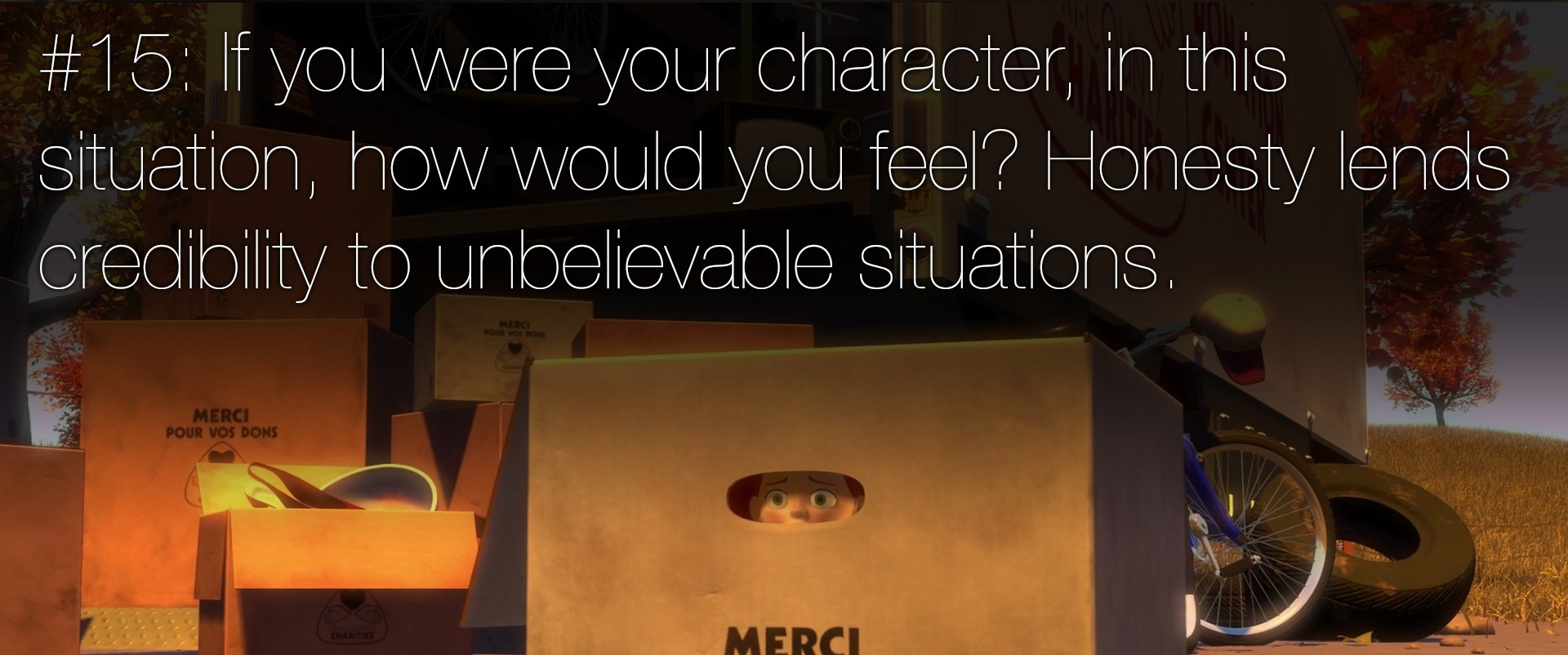A couple of years ago, then Pixar storyboard artist Emily Coats tweeted pieces of advice on making stories that she had picked up from working with Pixar, which were later compiled in several places on the internet, such as this io9 post. Later, Dino Ignacio created image macros of the individual rules which I am using in these posts.
Rule #15: “If you were your character, in this situation, how would you feel? Honesty lends credibility to unbelievable situations.”
While I spend most of my time addressing gamemasters in this series, I want to highlight the player’s approach with this rule first, as it’s something new roleplayers tend to struggle with, in my experience. I’ve seen a lot of new players freeze up or hang back during a session because they don’t know what their character would do. They’ve built up a notion of their character as a platonic ideal that exists outside their head and that they must emulate as faithfully as possible. And this is understandable, because most of the characters we encounter are external to us because they’ve been made up by someone else.
The thing is, your character doesn’t exist outside your head. Moreover, the idea of who your character is that you have in your head is invisible to the other people at the table; if you do something that conflicts with that idea, no one else is going to notice because they have nothing to compare it to. The moment you do something in-character, that becomes, for all intents and purposes, what your character would do in that situation. So instead of worrying about meeting some standard of fidelity, just pay attention to what you’re doing in-character. If your character reacts in a way that you find odd, take note, and come up with an explanation of their motivations that rings true for you. If you do something that is contradictory to how your character usually acts, don’t stress out; people often act in contradictory ways because they hold contradictory beliefs and because their actions are subject to contextual elements like their mood and the people involved. This kind of “mistake” can be a rich opportunity to develop your character as you build on how their decision-making changes under the weight of different emotional states, environmental cues, and health factors.
Now, for the GM’s side of it, having your NPC’s react believably to events around them is crucial for building a shared understanding of how your world works. It’s how you add emotional weight to actions. If an NPC’s friend or family member dies and their reaction is muted, the death isn’t going to feel real or significant in any way. The players will shrug their shoulders and move on. Either that, or the players, suspicious lot that they are, will conclude that your NPC called out a hit on their “friend.” That can be useful, but only if you planned for it so that the players don’t end up chasing a red herring that you inadvertently created for half the session.
This is not to say you shouldn’t subvert your players’ expectations for how NPC’s will react from time to time. You need to keep them on their toes and keep things from getting too predictable. You can also get some good mileage towards portraying a very different culture from what the players are used to by having NPC’s react in unexpected ways. If you do this too much, however, your players are bound to get frustrated and detached from the game as their ability to parse what is happening and what events mean withers away. That said, if you’ve done some of the work ahead of time of figuring out what your NPC’s are like and what their opinions are, it shouldn’t be hard to have them react in a believable fashion. Honestly, the hardest part might be remembering that they need to react at all.






